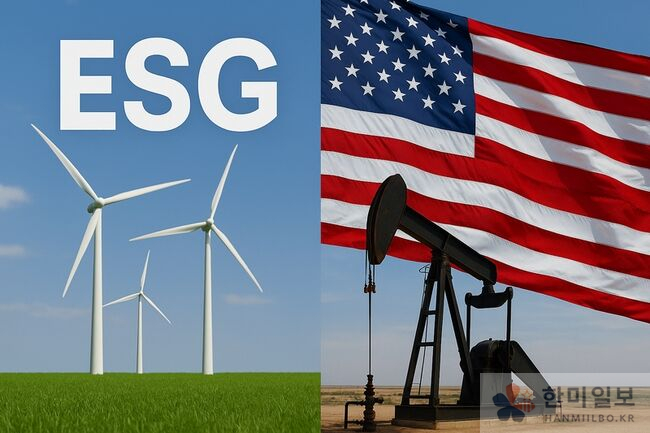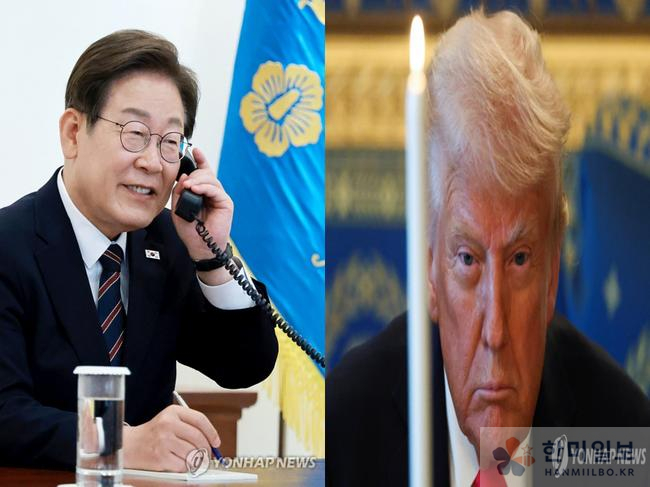 The left shows “ESG–wind power” while the right depicts “U.S. flag–shale drilling,” visualizing the clash between global ESG norms and America’s pursuit of energy and industrial independence. A composite image illustrating the theme of a “war of norms” beyond tariff disputes. © Hanmi ilbo Graphic 캡션Series Roadmap
The left shows “ESG–wind power” while the right depicts “U.S. flag–shale drilling,” visualizing the clash between global ESG norms and America’s pursuit of energy and industrial independence. A composite image illustrating the theme of a “war of norms” beyond tariff disputes. © Hanmi ilbo Graphic 캡션Series Roadmap
① ESG… Finance as the Weapon of Globalism
② The Challenge of MAGA… “Not a Tariff War but a War of Norms”
③ Political Correctness and Elections… How Democracy Was Tamed
④ The Election-Fraud Discourse… Fractures Between Globalism and Democracy
⑤ Korea’s Choice… A Time of Decision Between Two Systems
Trump’s MAGA line is often packaged as a tariff war. The tariff hikes launched during the 2018 U.S.-China trade conflict captured global headlines, leading many analysts to interpret them as traditional protectionism. Yet the message from the Trump camp went far beyond simple tariff disputes. Trump repeatedly declared, “America will no longer be bound by global rules.” That statement evolved into a direct challenge to both globalism and the ESG regulatory regime.
The Core of MAGA: Restoring Industry and Sovereignty
For decades, America ceded its manufacturing base to China and other emerging economies while expanding free trade and global supply chains. In this process, ESG norms—promoted by global financial elites and international institutions—curtailed even American companies’ freedom to decide investment directions. Firms unable to meet benchmarks for emissions, diversity, or social responsibility faced barriers in international capital markets. These constraints soon translated into domestic political pressure. Trump’s project was to break this structure outright.
Tariffs were merely a surface-level instrument. In reality, Trump pursued aggressive support for fossil fuels and nuclear energy—the pillars of “energy independence.” He rolled back environmental regulations to revive coal and shale industries, directly rejecting the “E” (Environment) of ESG. He also resisted the push for corporate board diversity and political correctness, branding the “S” (Social) of ESG as “industrial repression.” Instead of global norms, he installed a new command: “America First.”
From Economic Policy to Political Revolt
This orientation was not merely economic policy but a political revolt. Democrats and European leftists promoted ESG and globalism as universal democratic values, but Trump regarded them as external rules undermining U.S. sovereignty. MAGA thus expanded into a popular movement against political correctness and globalism.
In practice, many Republican-led states excluded ESG funds managed by firms like BlackRock from public pension portfolios and passed “anti-ESG laws.” Economic conflict shifted directly into a political frontline.
 South Korean President Lee Jae-myung (left) and former U.S. President Donald Trump (right) placed side by side. Trump’s “MAGA (America First)” stands in stark contrast to President Lee’s embrace of ESG and globalist norms. Yonhap·Hanmi ilbo Composite
South Korean President Lee Jae-myung (left) and former U.S. President Donald Trump (right) placed side by side. Trump’s “MAGA (America First)” stands in stark contrast to President Lee’s embrace of ESG and globalist norms. Yonhap·Hanmi ilbo Composite
“Not Pay Us, but Invest in a U.S.-Centered Order”
What made Trump’s MAGA unique was that resistance to norms became an attempt at financial-market independence. He demanded large-scale investments in the U.S. from Korea, Japan, and the EU—not merely to attract industry, but to pull allied capital directly into the American system, bypassing ESG-controlled global finance. His message to allies was not simply “pay up,” but rather, “invest in an American-centered order instead of globalist norms.”
Thus, the “tariff war” frame diminishes MAGA. In essence, it is a war of norms—rejecting the ESG order built by global financial elites and proposing a U.S.-style, real-economy-centered alternative. Trump’s target extended beyond China to the EU, international organizations, and Wall Street itself.
Still, the challenge is far from simple. The global financial system remains tied to dollar hegemony, and America cannot fully detach from international financial elites. Achieving true independence in capital markets may be impossible. Yet Trump’s declaration was clear: “America will not be bound by global rules; it will chart its own course.”
An Uneasy Question for Allies
This challenge forces difficult questions upon allies. Europe is strengthening ESG through CBAM (Carbon Border Adjustment Mechanism) and CSRD (Corporate Sustainability Reporting Directive). Korea and Japan, driven by export competitiveness, cannot ignore these rules. At the same time, the U.S. is pressing allies through the IRA (Inflation Reduction Act) and the CHIPS Act. Korea, therefore, bears a dual burden: Europe’s ESG framework on one side and America’s MAGA framework on the other.
MAGA is not merely protectionism but a political revolt against international norms and a new economic experiment. Whether it will succeed remains uncertain. But one thing is clear: this battle is not about tariffs alone—it is a monumental test of whether globalism, political correctness, and the ESG regime of financial elites can be overturned.
#MAGA #Trump #ESG #TariffWar #Globalism #PoliticalCorrectness #USChinaConflict #KoreasChoice #CapitalMarkets #HanmiIlbo